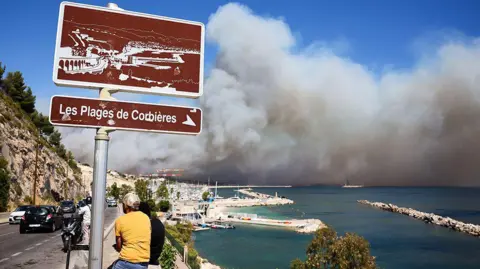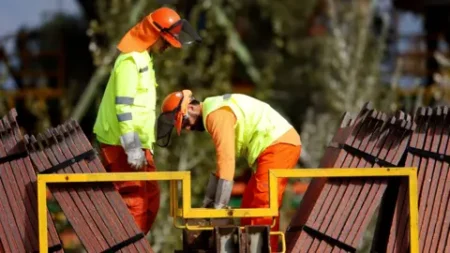In Marseille, France, a significant wildfire has emerged, prompting urgent action from local authorities and emergency services. Mayor Benoît Payan described the efforts of the marine firefighter battalion as being akin to “guerrilla warfare,” emphasizing the intense and challenging circumstances faced by firefighters who are combating the flames at the city’s edge. The situation has escalated to a point where nearly a thousand firefighters have been deployed to address the crisis, showcasing the magnitude of the emergency.
The prefect of the Bouches-du-Rhône region, Georges-François Leclerc, has advised local residents to stay indoors as firefighters take measures to “defend” the city from advancing flames. While the circumstances are fluid, Leclerc has stated that the situation is presently “under control,” highlighting the ongoing efforts to contain the wildfire and protect lives and property.
Devastatingly, reports indicate that at least 400 individuals have been evacuated from their residences due to the fire’s proximity, which has also led to the injury of nine firefighters. The scale of the wildfire has been alarming, with the fire spreading at an astonishing rate of 1.2 kilometers per minute at its peak. This rapid spread was attributed to a combination of strong wind gusts, dense vegetation, and the steep topography of the area, which have all contributed to the difficulty of controlling the blaze.
Amidst the chaos, French President Emmanuel Macron expressed solidarity with the firefighters and local residents, emphasizing the importance of following safety protocols. His message resonated as he took to social media, extending his thoughts to those affected and urging adherence to evacuation orders. Additionally, Interior Minister Bruno Retailleau was expected to arrive in Marseille later that evening to oversee the situation and offer support.
Compounding the crisis was the closure of Marseille Provence airport for the remainder of Tuesday. Airport president Julien Coffinier shared that he had never faced a situation of such magnitude during his tenure, adding to the sense of alarm and urgency in the region.
The wildfire reportedly ignited near Pennes-Mirabeau, a locality just north of Marseille, after a car fire on the nearby motorway. Local officials indicated that the fire has consumed approximately 700 hectares, or around 7 square kilometers of land. As authorities continue to grapple with the blaze, they have been advising residents to remain indoors, seal doors and windows, and keep thoroughfares clear for emergency services.
Eyewitness accounts have illustrated the alarming nature of the event, with one resident, Monique Baillard, describing the scene as “apocalyptic,” and noting that many in her community have chosen to evacuate. The Bouches-du-Rhône region has faced a severe drought, not receiving a single drop of rain since May 19, which has exacerbated the fire risk and conditions for containment.
Notably, the wildfire has not only affected Marseille; other regions in France are also battling flames. For instance, a separate wildfire near Narbonne, which began the previous day, has actively consumed around 2,000 hectares, fueled by winds reaching speeds of 60 kilometers per hour.
In a broader context, wildfires have also broken out across Europe, including severe events in the Catalonia region of Spain, where more than 18,000 residents faced evacuation orders due to approaching blazes. In Greece, 41 wildfires reported on the same day posed significant threats to populated areas, indicating a widespread pattern of drought and high temperatures affecting southern Europe.
The ongoing events in Marseille underscore a larger narrative of climate-induced challenges that communities are facing in various forms across the continent, highlighting the urgent attention needed in addressing climate change and its repercussions.











